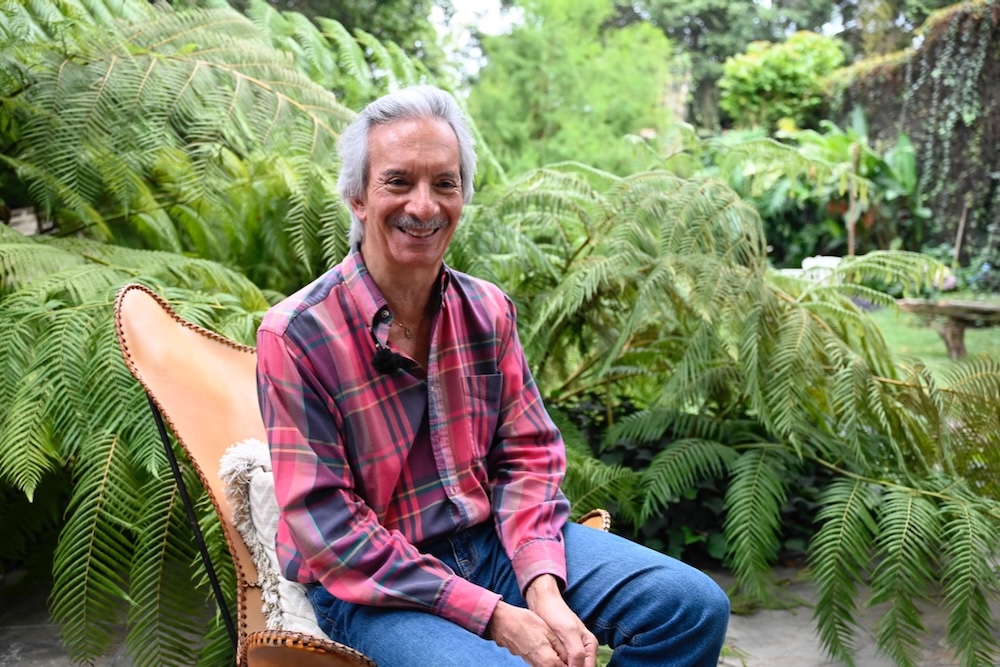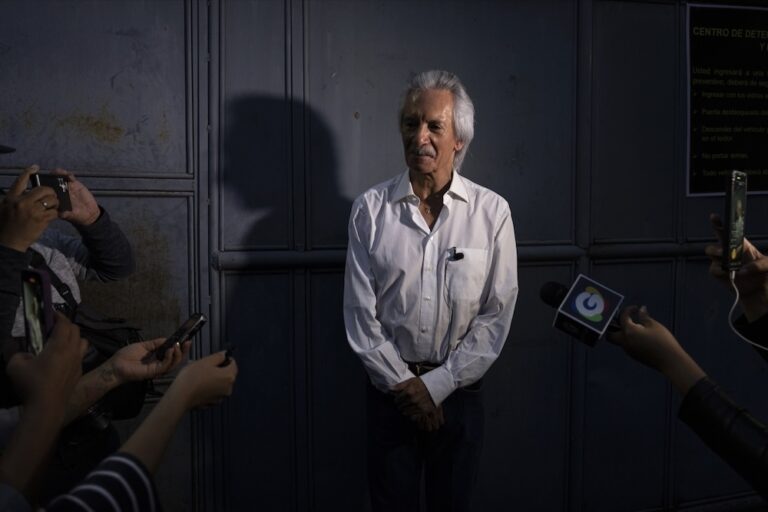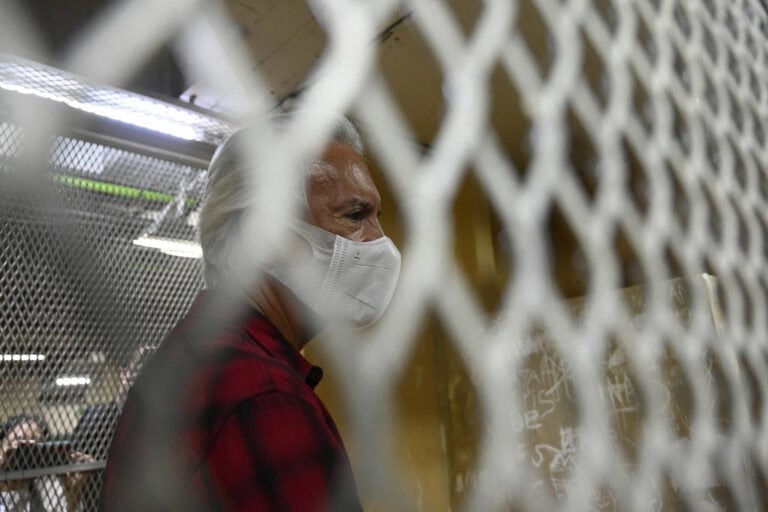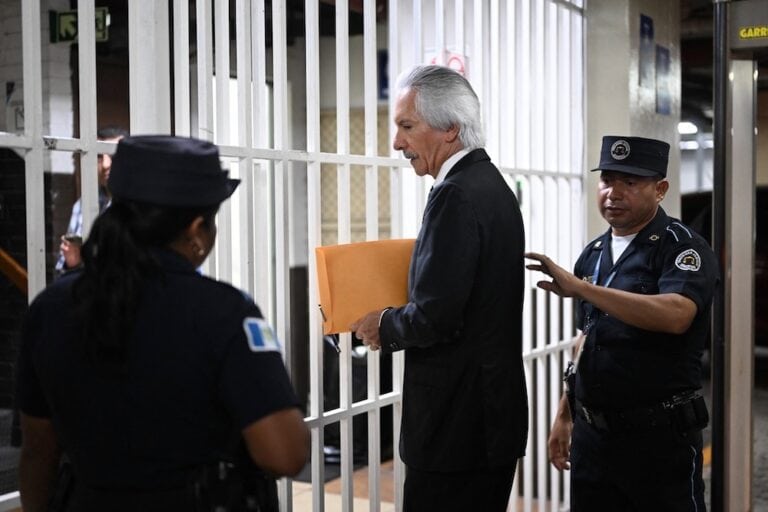Zamora was sentenced to six years' imprisonment in June 2023 on money laundering charges, which were widely criticized as politically motivated.
This statement was originally published on cpj.org on 18 November 2024.
Less than a month after being moved to house arrest, a Guatemalan appeals court ordered journalist José Rubén Zamora back to jail on November 15, 2024. Zamora remains in house arrest while his lawyers and the Attorney General’s Office have appealed the motion, his son told CPJ.
The decision is a new blow to press freedom in Guatemala. Zamora, president of the now defunct elPeriódico newspaper, had already spent 813 days in jail and experienced years of government harassment after his reporting challenged the country’s political elite.
Zamora was sentenced to six years imprisonment in June 2023 on money laundering charges, which were widely criticized as politically motivated. An appeals court overturned his conviction in October 2023; the retrial has been delayed by ongoing procedural hurdles.
CPJ has repeatedly urged the Guatemalan government, especially President Bernardo Arévalo, to end Zamora’s prosecution and the harassment of his family and the journalistic community.
In an interview with CPJ before the overturning of his house arrest, Zamora discussed the personal toll of these charges, his unyielding commitment to press freedom, and the growing threats faced by journalists in Guatemala’s increasingly repressive environment.
The interview has been edited for length and clarity.
What is it like to return home after more than 800 days in prison?
Returning home has been an experience full of intense emotions and unexpected moments. When I arrived home, my friends who had supported me throughout the entire process came with me to my house — 10 people who, during my imprisonment, brought me food and visited me once a week. After spending the night with them, I only slept for a few hours.
When I woke up, I found out that the directors of the Inter American Press Association (IAPA), who were gathered in Córdoba, Argentina, wanted to speak with me. And from there, calls and interviews began, one after another.
Diplomats and media from all over the world want to speak with me, and when I go for my daily walk — about 10 kilometers [6.2 miles] a day — people stop to greet me, take photos, and offer their support.
I appreciate the affection, but sometimes I feel overwhelmed. I wasn’t prepared for so much attention. I’m a shy person; I feel more comfortable writing than speaking in public, and this has been a big change. I also have health issues that I need to attend to, but I am here, trying to adapt.
I’m prepared, knowing they could come to take me back at any moment. And I’m ready here for when they come, to go back again. And I will come out again, and the time will come when they have to let me go free.
How was your experience in the Mariscal Zavala prison, located at a military base in northern Guatemala City?
Mariscal Zavala was a shock. They took me [in July 2022], with 18 armed men, and put me in a cell without any explanation.
I spent 14 days without sleep, with purple lights, and unable to communicate with my lawyers. During that time, they put insects in my cell that left wounds on my arms and legs. I also got poisoned by an insecticide that I managed to obtain to control the pests. Despite all this, my conditions improved when the new government changed: I was given better conditions, with light, heating, and more dignity.
The prosecutor’s office says it does not pursue you as a journalist but as a business owner. How do you respond to these statements?
For me, it is hard to conceive that José Rubén Zamora is not a journalist, as I have dedicated my entire life to this profession. They persecuted me and tried to imprison me just for doing my job. And when you add that they were seeking sentences for up to 20 years — the same maximum sentence given for crimes like money laundering or extortion — and they show as evidence my opinion columns, the argument that they are after me as a businessman loses all credibility.
Who is behind this, and why are they pursuing you?
What we’ve lived through in Guatemala has been a sinister metamorphosis of our democracy. Every four years, we elect a president who, rather than being a legitimate leader, is a thief, and he governs with the support of high-ranking military structures, organized crime, and monopolies. They’ve always been bothered by the fact that our newspaper did not align with their interests, that we were independent and denounced corruption and drug trafficking, which are part of that system.
Since 2007, a criminal structure has consolidated its power. It’s a web of interests that has taken over the country and is indifferent to the people’s problems. This is a power alliance that, although it has succeeded in persecuting me, has paid a high price. I think it would have been better for them if I had continued with my newspaper because, in the end, exposing their corruption was less damaging than my imprisonment.
This is not the first time you’ve found yourself in a dangerous situation because of your reporting. How has this affected you and your family?
My children never gave up. Despite the damage to their lives, they were always relentless. They worked tirelessly for my liberation and didn’t feel ashamed. The youngest one aimed to be an academic, was building a solid career and had to leave with his mother because they were after him. They even sent people to arrest him, but they were able to leave the country first. Now, he’s without a job, without documents, and his future is uncertain. It has been very tough for them and me, but they keep moving forward with strength.



